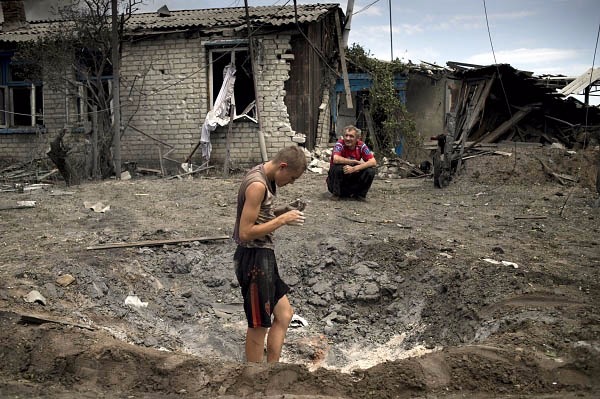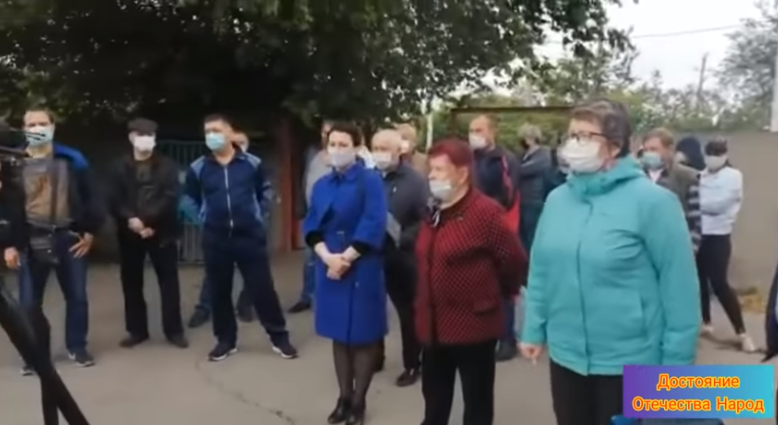In the Ukrainian capital, Oleksandr takes odd jobs to get by. In Luhansk, he had specialized in large farm animals, while veterinary medicine in Kyiv mainly focuses on dogs and cats. That’s why he can’t get a job in his specialty. Oleksandr failed to apply for a pension because he doesn’t have a record of dismissal from his previous job in Luhansk. Without such a record, he can't be employed officially. As he had to work off the books, the duration of his pensionable service wasn’t long enough to retire.
Texty.org.ua recorded Oleksandr's story, which describes the initial chaotic period of the Russian occupation of Ukraine's Donbas region. We bring you a slightly abridged English translation. This is part 1, read part 2 here.
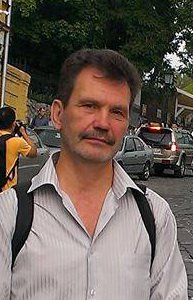
Summer of 2014. At that time I worked as the deputy chief of the Luhansk Regional State Hospital of Veterinary Medicine. At work, I was pretty much the only person who openly expressed his indignation at the separatist movement.
One of those outspoken separatists was my boss, ethnic Russian Vladimir Gneushev. He moved to Luhansk from Sakhalin, where he had previously worked. He couldn’t speak Ukrainian and allowed himself to ridicule words he didn’t understand. We had disputes on this topic. He scoffed at the words in the vocative case. Nowhere, he said, there is such a language feature, having forgotten that even Russian had it but lost it just a couple of hundred years ago.
During this period, pro-Ukrainian rallies often took place near the monument to [Ukrainian poet] Taras Shevchenko, I was always there taking a lot of photos. I once gave an interview to a TV journalist as to why I was taking part in it.
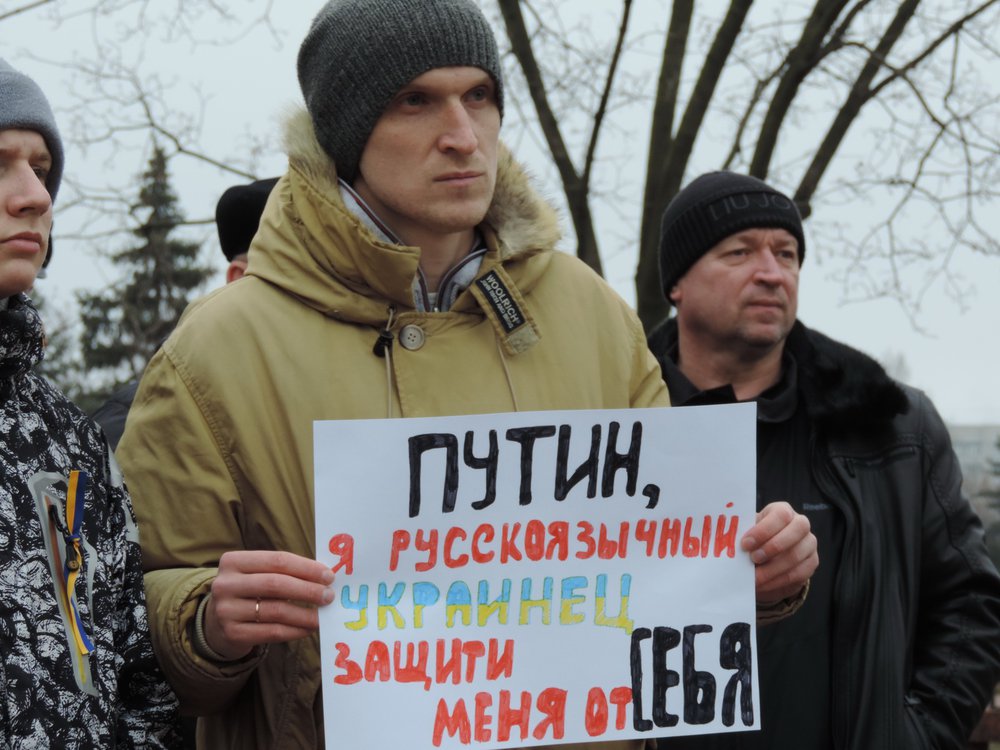
The next day in the presence of his subordinates, my boss announced that he would fire me. He called the participation in a pro-Ukrainian rally a reason for that. I even wrote a post about it on Facebook. However, he didn’t dare to dismiss me, although he openly threatened me,
"Here come our guys, we will knock off your head!"
When the Ukrainian authorities vanished in Luhansk (in late spring 2014, - Ed), he was last seen, according to my former colleagues, crossing the Ukrainian-Russian border, in the VAZ car that belonged to our hospital. After that, no one saw him in Luhansk.
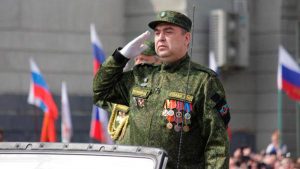
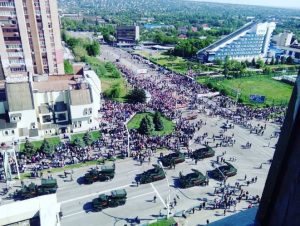
From our office’s windows, KAMAZ trucks were seen entering the territory of the bus station, with something like anti-aircraft guns mounted on their bodies. When the shellings of Luhansk began, a shell hit the courtyard of our organization as it exploded on the roof of the garage. Due to the threat to the lives of employees, our management ordered them not to go to work until the situation normalizes.
Arrest
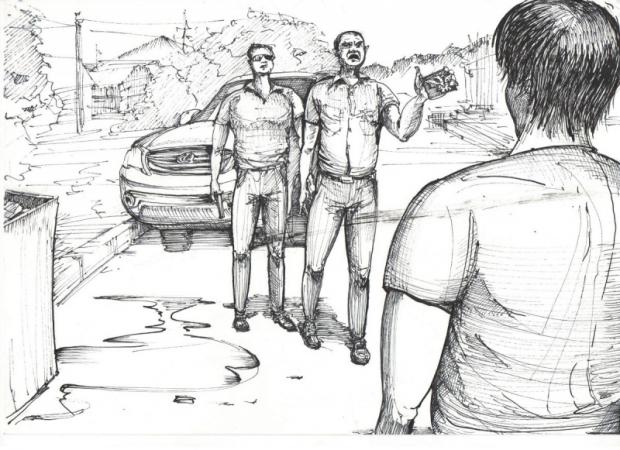
In a few days, I decided to visit my office to pick up my things and feed the fish in the aquarium. A guard usually secured the entrance to our building. When I approached the house, I saw that the door and the window next door had been shot through. The door was locked. I knocked and called, but nobody answered. I photographed the damage and was about to return home.
He resented me for not having my passport. He said he wasn’t satisfied with my work ID, using mostly foul language. Then he started asking where I work and what I am. Getting to know about my position, he said: “Oh, you are a bribe-taker! Everything is clear about you.” I asked him why he thought so. He said, "Because you're all bribe-takers there."
Then another armed man approached and started asking the same things. When he heard about feeding the fish, he blasted,
“What fish? War is coming! You are an artillery adjuster! You came to set beacons on us. Let's go and sort it out."
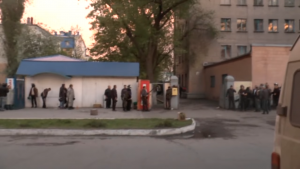
Here I realized what a stupid thing I had done. I was alone in the square. And the militants could have observed that I was trying to enter the building in front of their location while taking pictures of something from behind the stone wall.
I was searched and all my belongings were confiscated. I asked to be allowed to call my relatives. But they took away my cell phone and said I didn't need it anymore.
On the memory card of my camera and on my flash stick, they found photos of their military equipment entering the bus station, photos of the shelling damage in Luhansk, photos from Luhansk pro-Ukrainian rallies, as well as photos of the Maidan in Kyiv.
It was reckless of me to carry all this information with me. But I thought in terms of peacetime. Could I have imagined that someone would suddenly check my camera without my consent? In the deranged minds of the militants, a person who films their equipment or the damage from bullets and shells would be a spy.
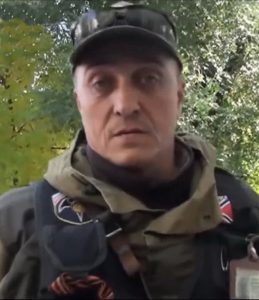
After looking at the memory card of my camera, one militant said that this was enough to execute me on the spot or shoot me in the legs. But they wouldn’t do it, because they had a kind of special counter-terrorist unit, "GBR Batman" (GBR stood for the “rapid reaction group”). And the Batman, as I later learned, was the call sign of their commander. Soon a car from that detachment came after me.
My first day in prison
I was brought to a small area between the dormitories of the Volodymyr Dahl East Ukrainian University (the Russian-controlled armed gang had seized its dormitories 2 and 5 in early May 2014, - Ed.). There was a group of militants. Among them, I saw an acquaintance. It was Serhiy Konoplytskyi, the driver and bodyguard of the former head of the Main Department of Veterinary Medicine in the Luhansk Oblast.
His department's office was located in the same building as the office of my organization and I had sometimes talked to Konoplytskyi. Back then, he had turned out to be an ardent Ukrainophobe who openly said that Ukraine didn’t exist. I had argued with him. Later it turned out that those conversations could have become fatal for me. When I saw him, I had a faint hope that maybe he would help me somehow. But, as it turned out later, our acquaintance only significantly worsened my situation.
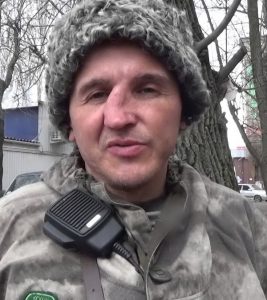
The commander of the Batman detachment, Oleksandr “Batman” Bednov, got into the car next to me. On my other side was a Russian militant Roman Omelchenko, call sign "Plastun."
Bednov asked me why there was a picture of the Ukrainian trident on the cover of my ID. I told him that it was the form of the ID I received from my management. "Batman" stated that I’d have shown my civic consciousness and given up my ID with the trident to get a normal document. I asked why then they demanded my passport with the same trident.
They looked at each other. Instead of answering, I received a professional punch in my face from Plastun. He had a broken nose. Apparently, he was a boxer. I was made to understand that here only they were the masters of the situation and that it was not worth arguing with them.
“If you now tell us who you work for, what your tasks were, to whom, where, and how you were to report on fulfilling them, we would simply set you free. If you don't tell us, we will beat you, skin you, cut you to pieces, and you will tell us everything,” said Bednov.

I looked at him and thought, "What kind of idiot can believe that you're going to let me go if I talk about my 'espionage' activities?" “I am a civil servant who just came to the building where I work. I did nothing illegal. If you want, you can kill me right here.” He replied: “We won’t shoot at you here. Because it will take too long to wash off the blood and brains from the car.”
After that, I was taken out of the car. Batman said that I would be taken care of by their specialist, who is a great master of extortion.
The basement, where I was taken, was located under a multi-story dormitory, seemingly, having 9 stories. Lit by a dim light bulb, the room I was in had an area of about 20-25 square meters. The humidity was very high, so that condensate flowed down the metal pipes. There were about a dozen civilians and an armed militant.
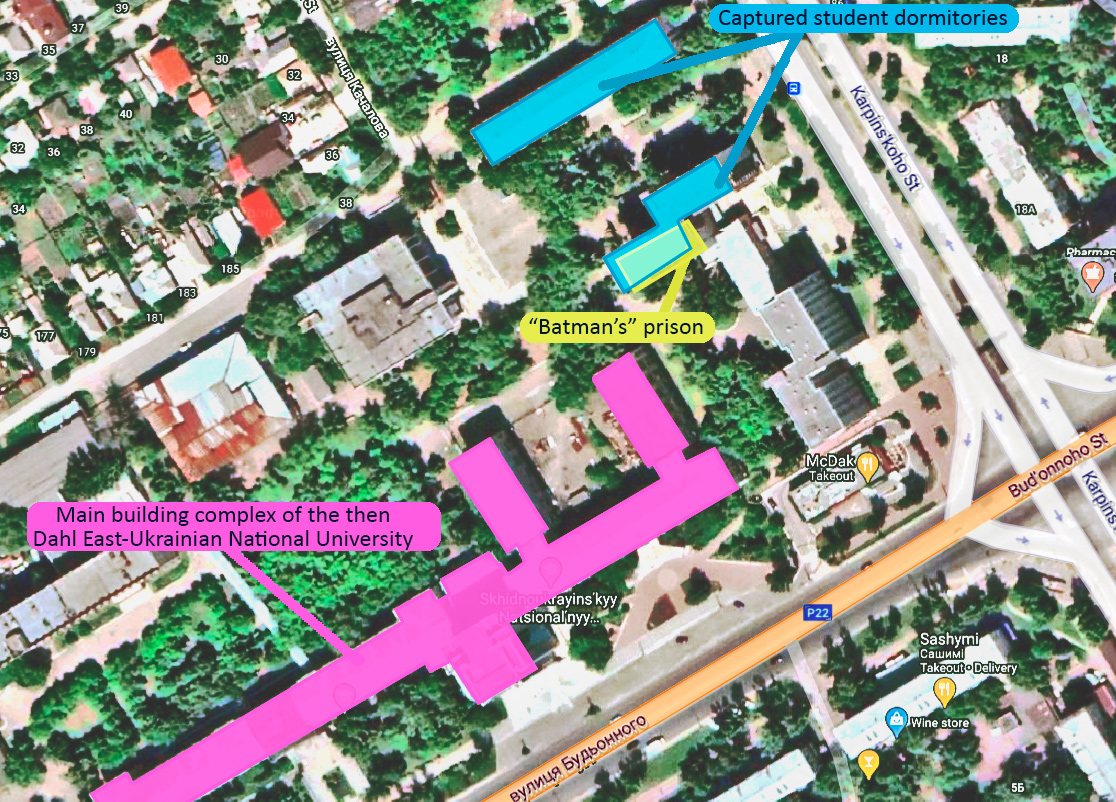
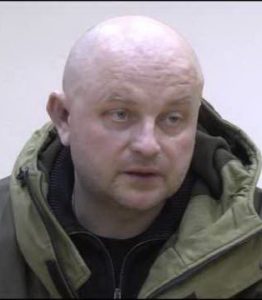
One of the men was on crutches. Another had his face covered in cuts. The third behaved inadequately in general, having obvious signs of mental disorder.
I was surprised that the number of mattresses was less than the number of people. I asked, "How do you sleep?" and was told, "In turns." The militant had a chair.
There was a toilet bucket in the corner, and it smelled accordingly there. I was not handcuffed.
A few hours later, the detachment’s regular torturer came to me, "Maniac" by his call sign. I found out his pseudo and position later. It was the same Serhiy Konoplytskyi that I had hoped for at first. Several other militants were with him. One of them, Sergey Zharinov, had a call sign Khokhol (a Russian derogatory term for a Ukrainian, - Ed.).
They took me to another basement. There I saw a corridor 15-20 meters long. In the corridor, my watch was removed from my hand, and for some reason Khokhol asked what size my shoes were. There were doors on both sides. I was taken to the first room on the right. It was a room with bare walls without furniture, which housed more than a dozen prisoners - women and men.
I found myself in the center of the room. Militants surrounded me from all sides. Maniac ordered me to sit on the floor. It was dirty concrete. I squatted down and immediately received a kick from Konoplytskyi in the heart. I fell.
Another militant, call sign Yanek, electrocuted me several times with an electric shocker. After that, they started beating me with their feet, hands, and batons. Other prisoners saw this. Khokhol put a noose around my neck and used it to drag me to another room.

It was a makeshift torture chamber with bare walls having only the Soviet-time stands of civil defense instructions. Maniac demanded that I give them information.
I explained again that I was a civil servant who hadn’t done anything illegal. I stressed that he knew me personally. He looked at me more closely and recalled, "Ah, so you're that Ukrop!" (укроп “dill” is the word that begins the same way as “Ukrainian” so Russian-led forces were trying to use it as an ethnic slur back in 2014, - Ed.) Our acquaintance and ideological differences only worsened my situation.
He said he’d move to more radical means. He pulled out a roll of synthetic cord, cut off two half-meter pieces. He made a slipknot at the end of each of them, pulled them on my wrists, previously having forced me to strip naked. I was brought to a table, thrown face down on it, and my arms were stretched in different directions with cords.
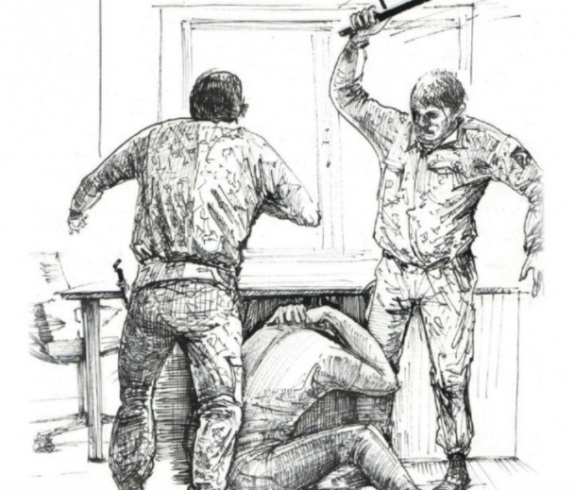
Maniac started beating me with a piece of plastic pipe all over my body. I screamed, but he didn’t get any confessions. Then Konoplytskyi ordered his accomplices to fix my right hand. He grasped my right index finger with his palm and began to bend it gradually towards the back of the hand to break it.
I did my best to resist. The table on which I lay collapsed due to my resistance. Maniac swore and ordered his assistants to bring a door panel from another room.
During this forced break, he told me what and how he was going to do with me in a few minutes. He took out the tarpaulin cover of the surgeon's field kit, unwrapped it, and started to show me the surgical instruments — cutting nippers, a surgical saw, scalpels, commenting on how he would snap off my fingers, saw my hands, and cut me.
I screamed asking not to maim me. I was ready to admit anything. But the Maniac insisted that I testify truthfully about my involvement in espionage. Then they started beating me with their hands and feet again.
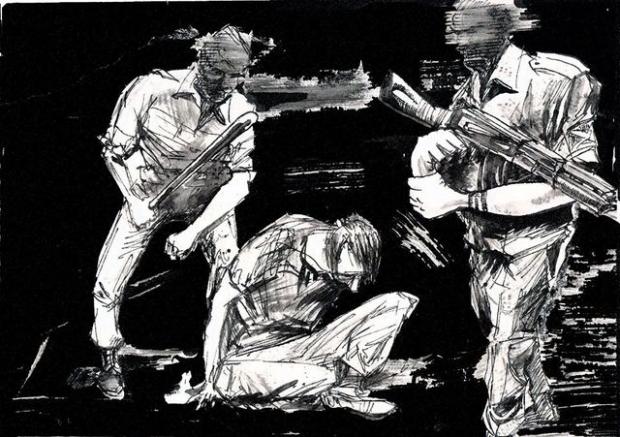
I think he understood it perfectly well that I wasn’t involved in any espionage activities. He knew that I was indeed a civil servant holding a peaceful post. But at the same time, he had to perform Batman’s task as they needed to obtain information from me about my involvement in espionage activities in order to boost the profile of their so-called counter-terrorist unit.
When they got tired, Maniac said that they would take a break, during which I was given the last and unique opportunity to recall everything in detail and tell honestly about everything.
I was handcuffed and thrown into the first cell where the other prisoners were. Under threat of severe punishment, they weren't allowed to help me. Also, I was forbidden to lie on the floor. No one came after me that evening.
Getting used to the pain
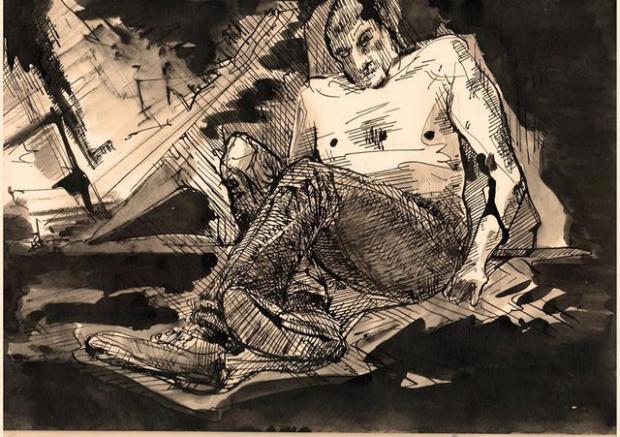
My whole body ached. It seemed to me that I had gone crazy, that I had gone mad. I didn't believe it was happening to me. I didn’t understand how it was possible to accuse a person of something without any proof, to throw them in a basement, to subject them to bullying and torture. I wouldn’t wrap it around my head. Then I stopped wondering because I faced even bigger idiocy. Like when people were thrown into the cell even because someone "gave them a funny look."
It is very humiliating to be naked in a room where there were other prisoners, including women. One of the prisoners gave me a chair. Because I was forbidden to lie down, but not to sit.
The handcuffs tightened and my hands began to turn blue. Only on the third day, at my numerous requests, a militant came to the cell with a bunch of handcuff keys. He messed with them for a long time and managed to unlock one hand but not the other. He said that the handcuffs might have broken or the key didn't fit. The prisoners of this cell gave me a rag to wrap around my thighs.
[boxright]
A businessman, nurse & food technologist: stories of three civilian hostages in occupied Donbas
[/boxright]
It was another militant who managed to remove the handcuffs. He brought me to the surface because there was not enough light in the cell from two windows of about 20x30 centimeters with one of them totally blocked.
After removing the handcuffs, he asked me why I was naked. I replied that my clothes were left in the torture chamber. He took me there and I was able to get dressed. He asked why I was still not a member of a local armed group. I referred to my age and health.
When Maniac saw me dressed that day, he was furious. He started beating me with a stick and demanded that I tell him who had allowed him to break his order. I said him it was the call sign Transit. He promised to deal with it. But I don't think he could have caused any trouble for a Russian.

Plastun visited the cell regularly. He asked me questions and punched me in the face no matter what I answered. His blows were professional. They caused a rather large hematoma under my left eye that lasted for quite a long time.
Maniac was a quite often guest too. Beatings were a part of his visits constantly. After another beating, I had a severely injured right wrist, which was swollen and very painful. I had bruises of soft tissues all over the body.
At another beating session, he said something like this: "All of you bitches who worked there then, those who are involved in this, should be beaten, squeezed." He projected his personal outrage on me.
Prisoners were there too. Two of them were in critical condition after being severely tortured. Maniac and Khokhol regularly visited the second cell and systematically mocked prisoners. During one of such visits, Khokhol broke several more ribs on my left side.
The prisoners suffered from suffocation. One night I had a heart attack. I had to knock on the door and ask to take me out of the cell to breathe. I was taken to solitary confinement. There was a big window without glass. The window was filled up with large boxes.
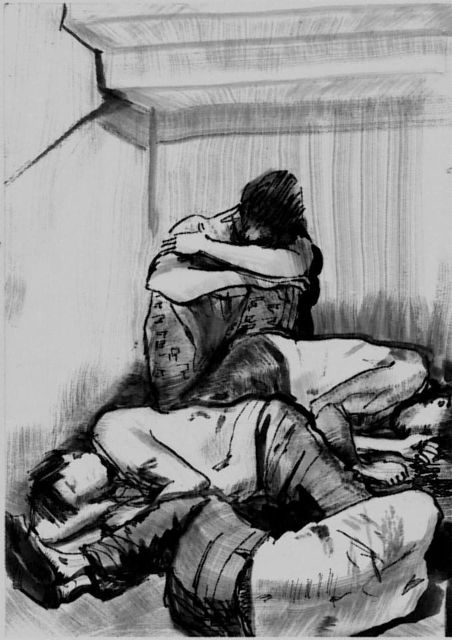
At that time there was no electricity in Luhansk for almost a month, and we lived in semidarkness. One morning the Maniac entered the cell and aimed a ray of light from a powerful flashlight at my face. After being in the dark, I was blinded, and he hit me in the chest with a gun. I almost suffocated from the pain.
Maniac commented on his actions as follows, "I came to wish you good morning!" After that, I had chest pain for a long time, and at first even just getting up was problematic for me. After arriving in Kyiv, I did an examination and an X-ray, which showed that I had a broken sternum.
What were you jailed for?
Another had bruises on his face, and torn wounds left by the jaws of a trained German shepherd on his buttocks. The third had his ribs smashed by the brutal beating. What did these people have to do to be treated like that?
It turned out that one of these "enemies" and his wife went to their dacha, a summer cottage in the area of the memorial Hostra Mohyla to harvest cucumbers, tomatoes. They stayed there for several days. He went for the groceries to a nearby store.
[boxright]
Surviving the “DNR/LNR”. Photo project reveals the horror of captivity
[/boxright]
He was walking down a path when he suddenly heard a burst of an automatic firearm fly above his head. Then the same burst hit the ground at his feet. Shouts, orders to lie on the ground. He lay down. Armed militants ran up to him, put a sack on his head, and tied his hands behind his back. “What are you doing here, bitch? Our detachment deployed here. We are being fired on.” And they called him an adjuster (being an adjuster for Ukrainian artillery or a Ukrainian spy were two most often used accusations for pro-Ukrainian residents of the occupied territories, - Ed.).
Two other men, who were walking to their summer cottages near the detachment, were also proclaimed adjusters and subjected to beatings and torture.
Later on, the basement was visited by an ambulance doctor, call sign Skoryi. People who got there earlier explained that he had also been jailed here. As the militants found out that he was a medic, he was released on the condition that he come in his spare time to help the victims of torture.
He helped three elderly men. He told one that his ribs were crashed so much that he should lie down all the time, otherwise fragments of broken ribs could pierce vital organs, leading to inevitable death. Then he said to Batman, "If you don't need a corpse in the basement, you should release and hospitalize him." He was released sometime later.
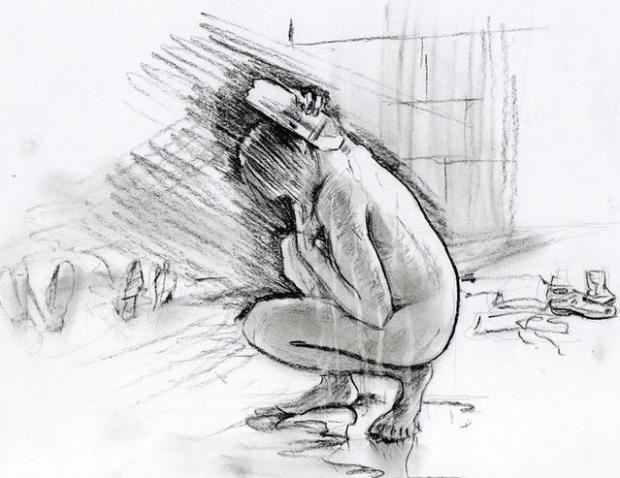
Periodically, militants from this and other units came to the basement in order to "look at these freaks, at these Ukrops," to train on them like on punching bags. They also beat those who could not stand up, mocked them, hit them on the head with the pistol grip, put the pistol barrels to their temples, threatened to shoot them on the spot, and kicked them in the stomach. The fighter with a playful call sign Romashka (“Camomile") especially liked to be engaged in it.
I was later transferred to another cell. In that cell, there was a minor girl aged 14 to 16. I don't know why she was thrown into the basement. The guards treated her well. She felt quite free.
There was a ban on access to the corridor. It was possible to go there only with the permission of a jailer. But she was treated favorably, and often went out into the corridor without permission, chatted there.
At one such moment, Maniac saw her. He shouted. He said that she would be punished for violating his order. The punishment was that she was sent to combat positions of the militants to satisfy their sexual needs.
Everyday life
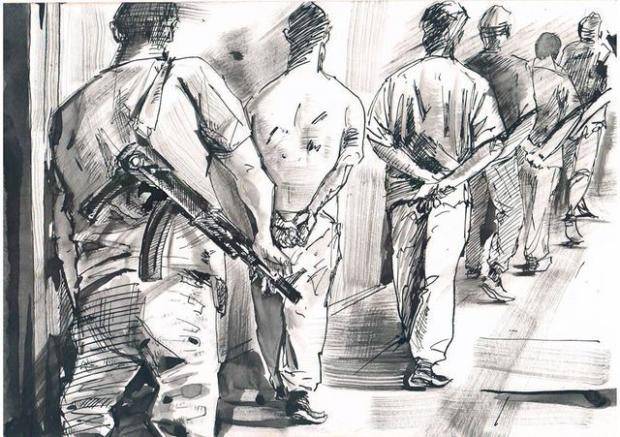
We were fed twice a day. Closer to noon and sometime in the evening. It was porridge or often soup - sometimes even without salt, sometimes with some additions, cooked in the same kitchen as for the militants. But the quality of the food was completely different. We used to get some leftover meat so that we wouldn't get completely emaciated.
From such "hearty" food my pants were slipping down. Moreover, they took my belt away at the start. I found a cord and fastened them.
Read also: These four stories show anybody can be jailed in occupied Donbas (and you too)
They were assigning two people from among the prisoners to work in the kitchen. Those did some work there, brought pots of food to the basement, and gave us disposable utensils.
None of the jailers cared about the hygiene of prisoners. We didn't have soap, toothpaste, or any other hygiene products. On the 40th day of our stay, at the doctor Skoryi's request, we were allowed to come to the surface, where they set small basins and gave soap and a bucket of water to every person. They said we had five minutes for washing ourselves and our things. Only in daylight did I realize how dirty my clothes had become.
Read also: Donetsk art center turned into concentration camp: former hostages share their memories
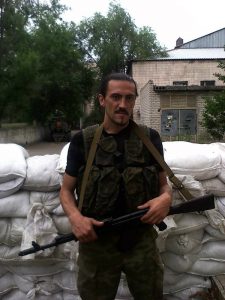
One of the militants, a Russian, call sign Luish, who was the head of the prison at the time, later wrote memoirs about his stay in Luhansk in the GBR Batman detachment and published them on the Internet. He called his opus "Militiaman Tsykunov (Luish). Four months in Luhansk." This memoir is still available online.
He recalled it this way,
“I remember the astonishment of our fighters when they saw all my wards on the premises when I was taking them out for washing. Our people knew that there were a lot of people in the basement, but the march of nearly a company surprised them. That event looked very funny… Summer heat, naked men wash in basins on the grass in the backyard, others are waiting their turn…”
Water was supplied to us from the surface. There was a tanker truck on the territory. One or two people were sent for water from the basement with a wheelbarrow so that they could fill plastic bottles and bring them to the basement and distribute them among the cells. The water was potable.
Read also: A businessman, nurse & food technologist: stories of three civilian hostages in occupied Donbas
They gave us a plastic basin, and we washed over it. For the physiological needs, we had a bucket. However, only for doing number one. For doing number two and visiting the toilet, which was only in the first cell, we came up with all sorts of tricks. Usually, the reason for this was that the bucket of urine and dirty water was already full and had to be flushed down the toilet. This way we were allowed to go to the toilet.
We ourselves had to obtain hygiene products. How?
After the militants seized the university and dormitories, students were given little time to pick up their belongings and documents. So there were a lot of things left in the university dormitories. The rooms had furniture, appliances, clothes, books, and even student record books and diplomas. Militants often tossed such documents in the garbage.
Periodically, we were sent there to perform various works. The militants who lived in this dormitory needed household appliances, furniture, and we were used as free labor. During such works in the dormitory, I found a pack of salt, a kettle, several packages of spices, and a knife. I managed to carry all this stuff into the cell.
You can find more on the seizure of dormitories of the East-Ukrainian University in the testimonies of its students in the article Militants held researcher of the history of the "Young Guard" in the basement for almost a month (in Russian).
One day our guys were taken to plunder a confectionery warehouse. That day was a holiday for us.
Read more:
- War crimes in occupied Donbas: every second prisoner tortured, 16% witnessed executions
- A businessman, nurse & food technologist: stories of three civilian hostages in occupied Donbas
- “Russians taught how to torture.” Ex-captives of Donbas “republics” share horrors of basement prisons
- Surviving the “DNR/LNR”. Photo project reveals the horror of captivity
- War on terms: who’s fighting against Ukraine in Donbas – terrorists, rebels, insurgents?
- Donetsk art center turned into concentration camp: former hostages share their memories
- Ukraine swaps 127 prisoners including defendants of Maidan massacre to 76 Ukrainians held in occupied Donbas (2019)
- Zelenskyy’s prisoner swap: should Ukraine rescue its hostages at any cost?
- Human rights NGO reports on 119 known hostages behind bars in occupied Donbas (2019)
- A month of freedom: released hostages tell about captivity and torture in occupied Donbas
- These four stories show anybody can be jailed in occupied Donbas (and you too)


